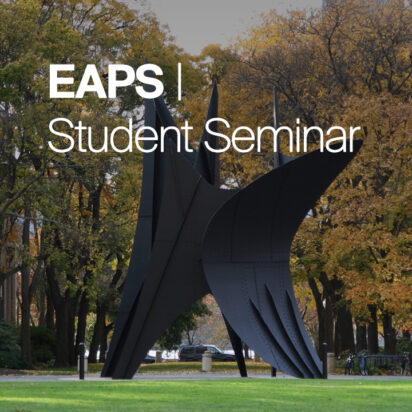
[ESAC Student Seminar] Steph Elkins
Date: Friday, April 19, 2024 Time: 12:00 - 1:00pm Location: 54-1827 | MIT Campus, Cambridge, MA“Atmospheric Composition and Climate Responses to US Air Pollution Controls”
Large-scale regional perturbations in anthropogenic emissions, such as those due to national air quality controls like the US Clean Air Act (CAA) of 1970, have significantly altered the composition of short-lived climate forcers, namely ozone (O3) and aerosols, which have counteracting radiative effects. Due to their relatively short lifetimes, changes in the distribution of these species and their subsequent radiative forcings are inhomogeneous in space and time. Concentrations of O3 and aerosols may also be altered by changes in natural processes, including natural emissions, transport, or deposition. Therefore, to better understand the effect of anthropogenic “forced” changes on atmospheric composition and climate, we must place them in the context of climate variability i.e., changes that could have occurred due to natural fluctuations in the climate system alone. In this study, we utilize a 13-member initial-condition ensemble generated by a fully coupled global chemistry-climate model (CESM2-WACCM6) that simulates the “world avoided” by the CAA from 1970-2014 (NoCAA ensemble). We compare this scenario to a “matching” historical ensemble (HIST ensemble) that simulates real-world emissions over the time period. By averaging across ensemble members, we can reduce the noise from climate variability and directly quantify the change in forced signal between scenarios, detecting regions and seasons where climate and atmospheric composition variables respond robustly to the divergent emissions trends. We find reductions in tropospheric O3 as a result of the CAA are greatest in the summertime and near the source region, with significant decreases extending over the Atlantic Ocean and much of the Northern Hemisphere. Reductions in aerosol loading occur in all seasons over the US but are greatest in the summertime. We estimate the forced response of average US surface temperature to be an increase of .35 degrees but show that this change is not robust against climate variability.
ESAC Student Seminar Series
A forum for students and postdocs to share recent research, hone presentation skills, and build community among peers, sponsored by the EAPS Student Advisory Committee. Open to current EAPS graduate and undergraduate students and postdocs. Typically hosted on Thursdays during the semester, including pizza lunch.
Contact: esac.officers@gmail.com
